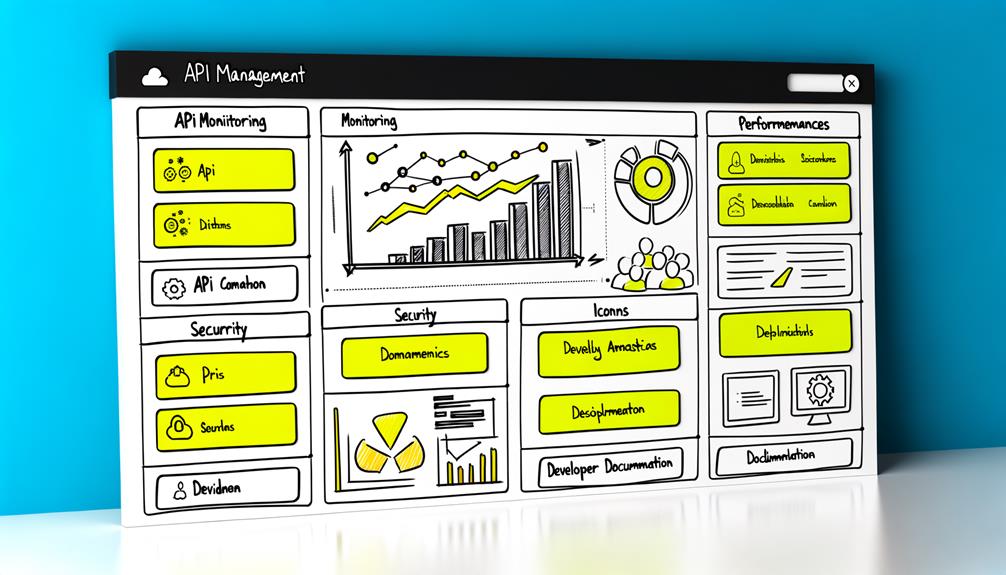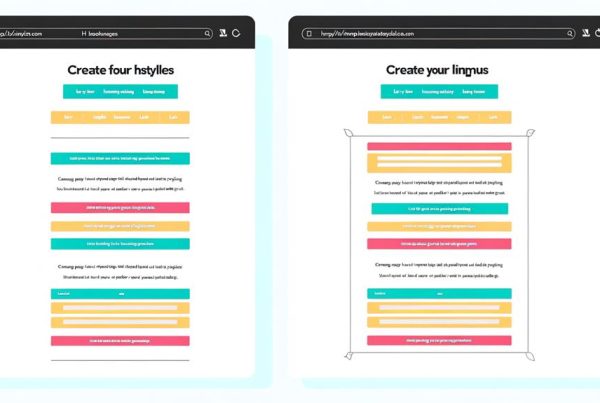As we navigate the ever-evolving digital landscape, the concept of API management can be likened to a well-orchestrated symphony, where each instrument plays a crucial role in creating harmonious melodies.
Picture this: a renowned orchestra, where the conductor skillfully coordinates the diverse talents of the musicians to produce a seamless and captivating performance.
In a similar vein, API management serves as the conductor in the digital realm, orchestrating the flow of data and functionalities between disparate systems and applications.
But what exactly is API management, and why does it matter? Let's explore this intricate symphony of technology, unraveling its significance and impact on today's digital ecosystem.
Understanding API Management

Understanding API management involves comprehending the crucial processes and tools essential for building, securing, governing, and analyzing APIs. It's imperative for organizations to grasp the significance of API management in ensuring the seamless functioning and security of their digital assets.
By embracing API management, organizations can effectively govern the access to their APIs, enforce security protocols, and gain valuable insights through analytics. With the right API management platform, organizations can streamline their API lifecycles, automate processes, and provide a centralized marketplace for developers.
This empowers organizations to liberate their development teams from redundant work, ensure compliance with data governance and security regulations, and make data-driven decisions for continuous API improvements. Embracing API management is pivotal for organizations seeking liberation from the complexities of modern digital integration.
Key Benefits of API Management
Embracing API management enables organizations to achieve several key benefits.
Efficient governance is one of these benefits. API management allows organizations to liberate their development teams from redundant work. This means that developers can focus on creating new and innovative solutions instead of spending time on repetitive tasks.
Enhanced security is another advantage of API management. By implementing robust security measures, organizations can ensure compliance with data governance and security regulations. This helps protect sensitive data and mitigate the risk of unauthorized access or breaches.
Streamlined automation is also facilitated by API management. With proper management in place, organizations can automate various processes and workflows, reducing manual effort and increasing operational efficiency. This leads to improved productivity and cost savings.
Lastly, API management enables organizations to make data-driven decisions for continuous API improvements. By analyzing API usage data and performance metrics, organizations can gain insights into how their APIs are being used and identify areas for optimization. This iterative approach helps organizations enhance their APIs over time, leading to better user experiences and increased business value.
API Management Platform Features

Our organization thoroughly evaluates API management platform features to ensure they effectively support our API lifecycle management needs. When considering API management platforms, we prioritize robust capabilities that align with our governance, security, and automation requirements. Here's a comparison of key features to consider:
| Feature | Description |
|---|---|
| Access Control | Dictate access permissions for resources |
| Authentication & Protection | Implement protocols to verify user identity |
| Design and Build Support | Assist in API creation, maintenance, and monitoring |
| Support for Different API Types | Flexibility to accommodate various API architectures |
Importance of API Management Tools
Thoroughly evaluating API management platform features to ensure robust capabilities that align with governance, security, and automation requirements, we prioritize the effective support of our API lifecycle management needs.
Enhanced Governance: API management tools aid in ensuring compliance with corporate policies and data privacy regulations.
Strengthened Security: These tools enforce rules around data governance and API security, limiting access to authorized users.
Streamlined Automation: API management platforms support automating the creation of APIs, saving time for developers and maintaining quality and security.
Actionable Analytics: These tools provide insights into API usage, enabling data-driven decisions for API improvements.
API Management in Practice

We consistently implement best practices for API management to ensure seamless integration and optimal performance across our systems. As part of our API management strategy, we employ various tools and platforms to streamline our processes and enhance the capabilities of our APIs. Below is a table highlighting some popular API management platforms and their key features:
| API Management Platform | Key Features |
|---|---|
| MuleSoft Anypoint | Cloud-based platform, supports API deployment to the cloud and SaaS tools |
| Boomi API Management | Single interface for connecting enterprise applications, offers developer portal and analytics dashboards |
| Akana API Management Platform | All-in-one solution for designing, building, managing, and monitoring APIs, focuses on API security |
| IBM API Connect | API manager for DevOps, provides central integration platform, enterprise-grade security, and integration with open-source tools |
| Broadcom Layer7 API Management | API manager with focus on microservices and testing, offers scalable testing strategies and a developer portal |
These platforms play a crucial role in our API management practices, allowing us to meet the evolving demands of our organization and stakeholders.
Frequently Asked Questions
What Are the Key Differences Between Different API Management Platforms?
The key differences between various API management platforms lie in their capabilities for access control, authentication, design support, different API type support, and the presence of a developer portal.
Each platform offers unique features and focuses on specific aspects such as security, cloud deployment, enterprise-grade integration, or microservices testing.
Understanding these differences helps organizations choose the most suitable API management platform to meet their specific needs and business requirements.
How Can API Management Help in Improving Developer Productivity and Efficiency?
API management helps improve developer productivity and efficiency by automating API creation, providing analytics on usage, and streamlining onboarding processes.
It ensures secure access control, authentication, and protection, supporting various API types.
API management platforms offer a developer portal, easing API discovery and implementation.
With tools like MuleSoft Anypoint and Boomi API Management, organizations can optimize developer workflows, fostering innovation and rapid application development.
What Are the Best Practices for Implementing API Management in an Organization?
Implementing API management in an organization requires careful planning and execution. It involves defining governance and security measures, automating processes, leveraging analytics for informed decision-making, setting up a developer portal, and streamlining onboarding.
These practices ensure efficient and secure API lifecycles. By following these best practices, organizations can effectively manage their APIs, enhance accessibility, and encourage seamless integration.
How Does API Management Support the Integration of Legacy Systems With Modern Applications?
API management supports legacy system integration with modern applications by providing access control, authentication, and support for different API types. It allows organizations to control access, authenticate users, and accommodate various API architectures. This ensures secure and smooth integration of legacy systems with modern applications, facilitating a seamless transition.
Additionally, API management platforms offer design and build support, enabling organizations to modernize their systems while maintaining security and availability.
What Are the Potential Risks and Challenges Associated With API Management Implementation and How Can They Be Mitigated?
Potential risks and challenges with API management implementation include:
- Security vulnerabilities
- Integration complexities
- Scalability issues
These can be mitigated by:
- Conducting thorough security assessments
- Employing robust authentication methods
- Implementing comprehensive monitoring and logging
Additionally, addressing integration challenges and ensuring scalability can be achieved by:
- Creating clear documentation
- Offering regular training for API users
- Establishing a feedback loop for continuous improvement.
Conclusion
In conclusion, API management is a crucial aspect of modern digital operations. It offers governance, security, automation, and analytics for the distribution of APIs, ensuring their efficiency and protection.
With the right API management platform and tools, organizations can effectively control access, safeguard APIs, and support various API types.
By understanding and implementing API management practices, businesses can unlock the full potential of their digital ecosystem and stay ahead in the competitive landscape.







